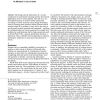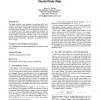1863 search results - page 14 / 373 » The Case for Design Using the World Wide Web |
SOCO
2002
Springer
13 years 7 months ago
2002
Springer
Retrieving relevant information is a crucial component of cased-based reasoning systems for Internet applications such as search engines. The task is to use user-defined queries to...
WWW
2003
ACM
14 years 8 months ago
2003
ACM
This paper describes a new paradigm for modeling traffic levels on the world wide web (WWW) using a method of entropy maximization. This traffic is subject to the conservation con...
ADAPTIVE
2007
Springer
13 years 9 months ago
2007
Springer
With the exponential growth of the available information on the World Wide Web, a traditional search engine, even if based on sophisticated document indexing algorithms, has diffi...
BEHAVIOURIT
2002
13 years 7 months ago
2002
Abstract. An experiment is reported that compared expandable indexes providing full menu context with sequentialmenus providing only partial context. Menu depth was varied using hi...
ICSE
1997
IEEE-ACM
13 years 11 months ago
1997
IEEE-ACM
Traditional software inspection requires participants to meet together at the same time in the same place. Distributed, asynchronous inspection allows participants to conduct meet...


